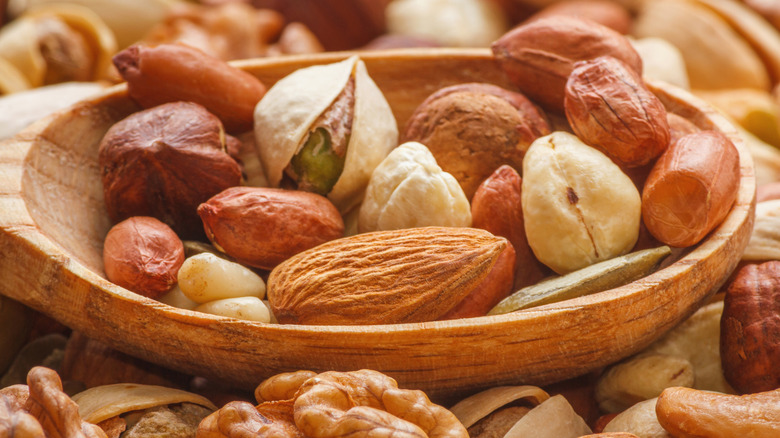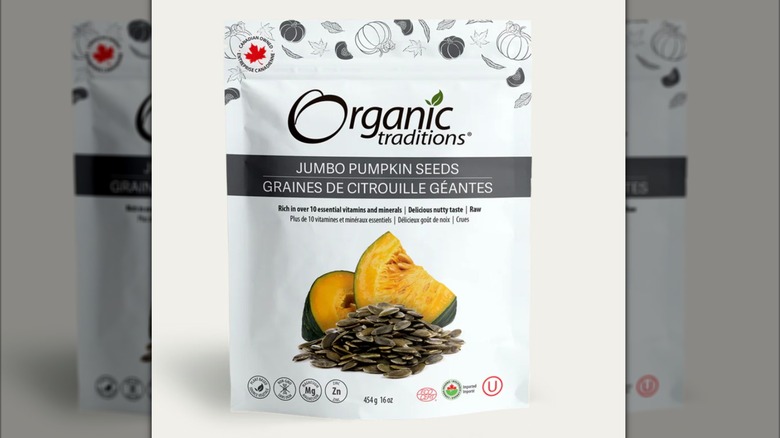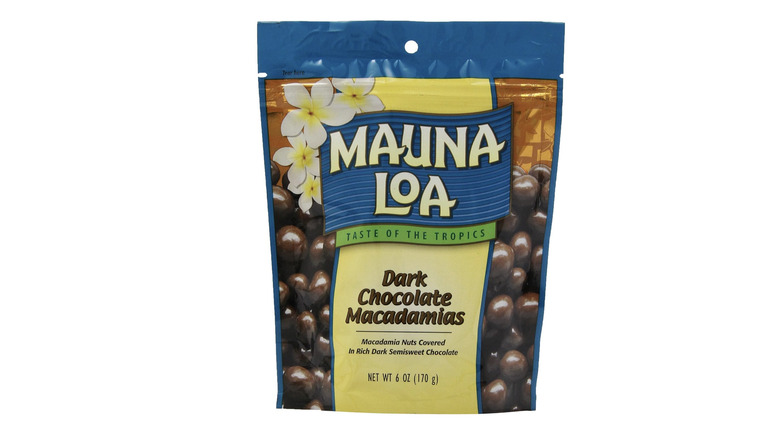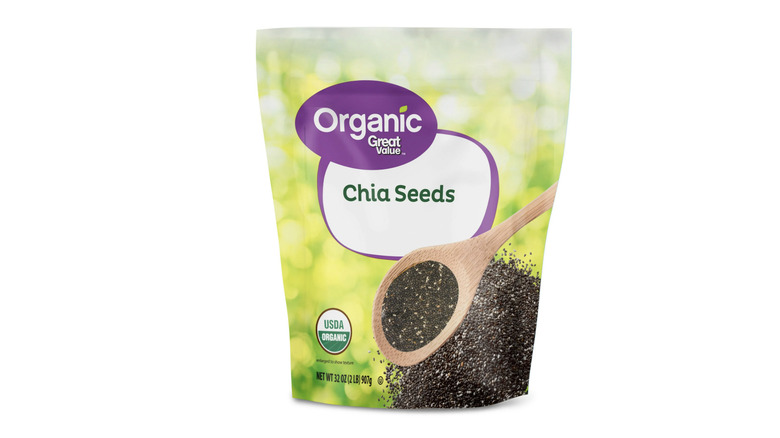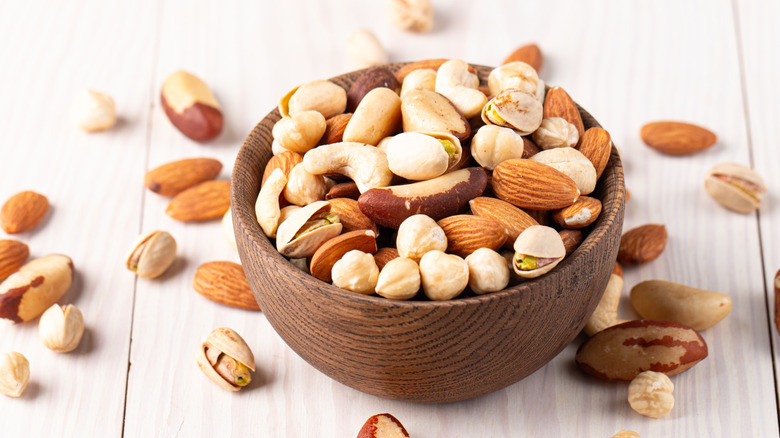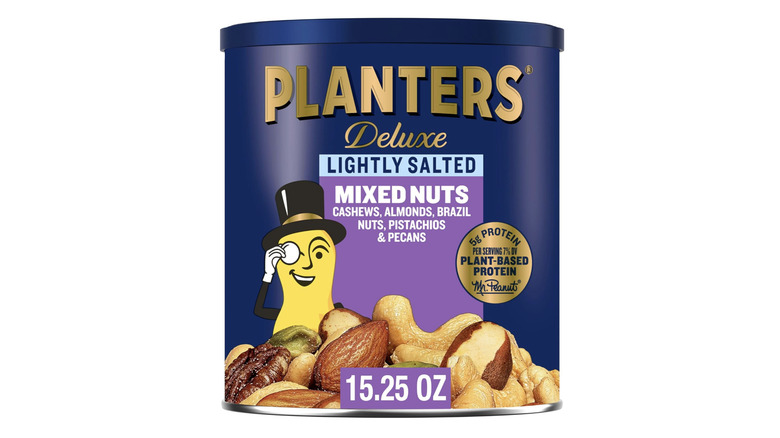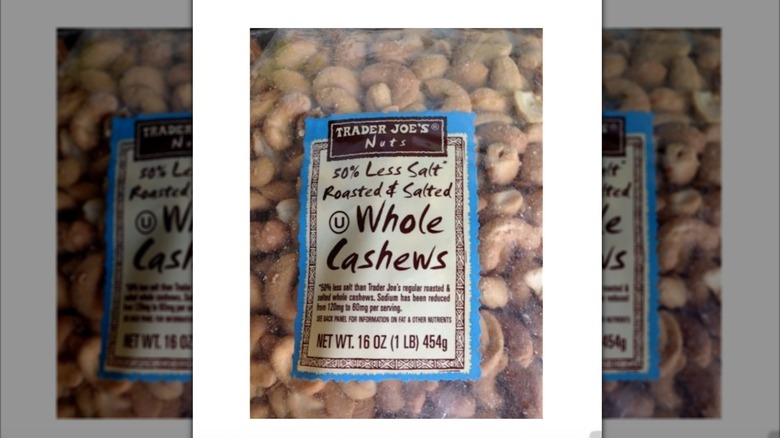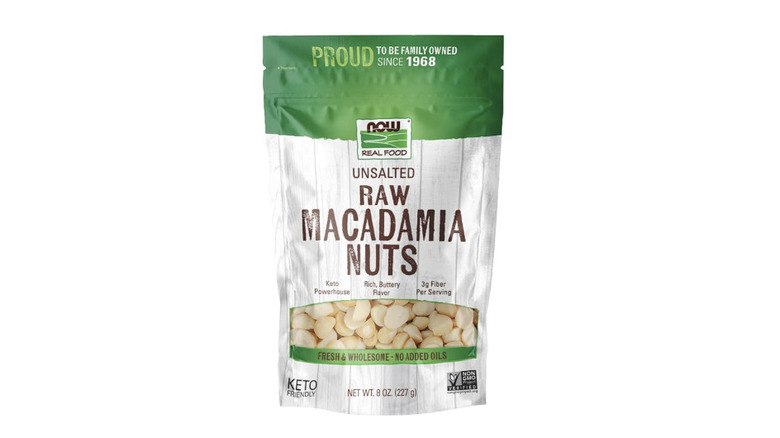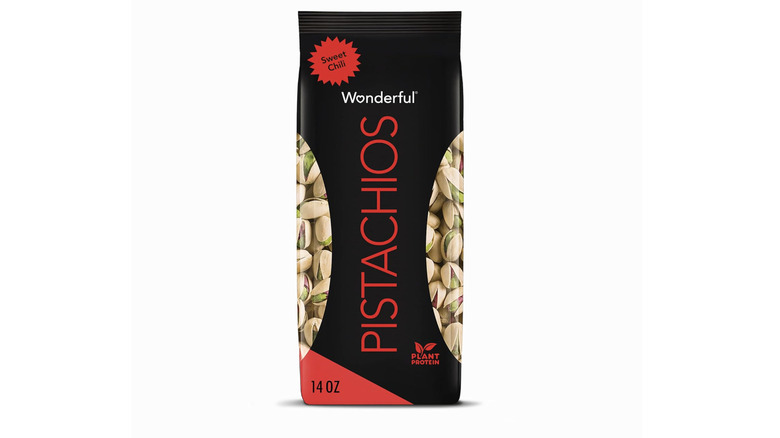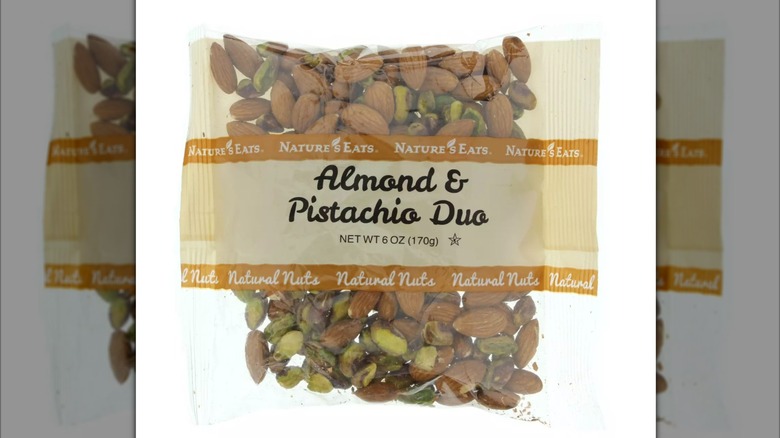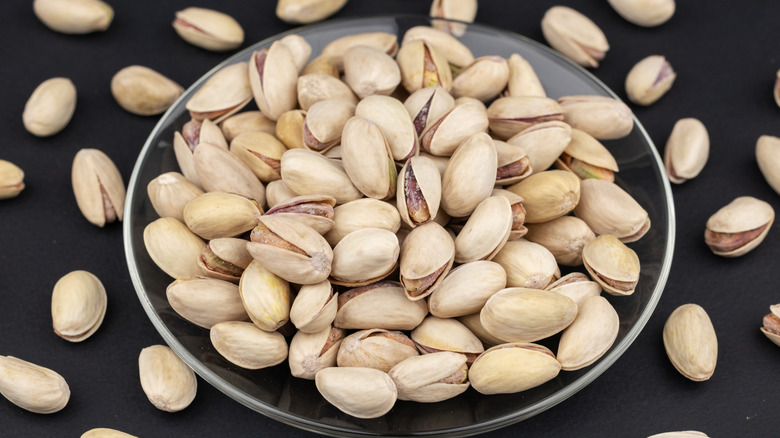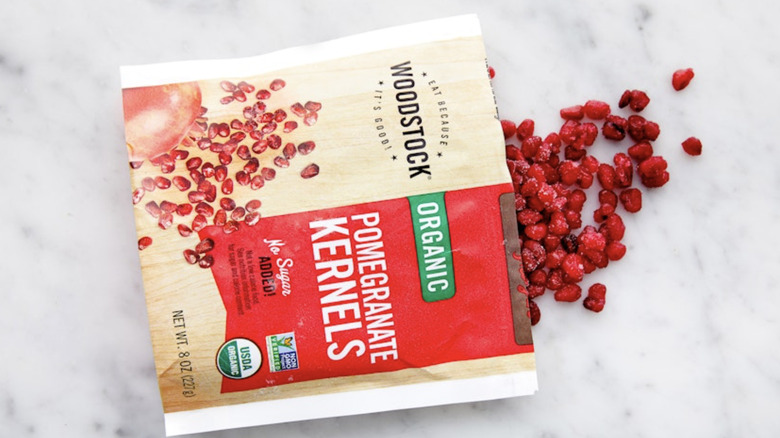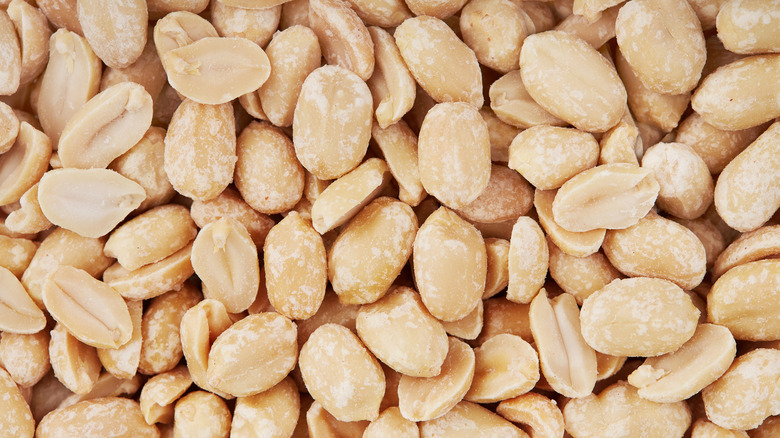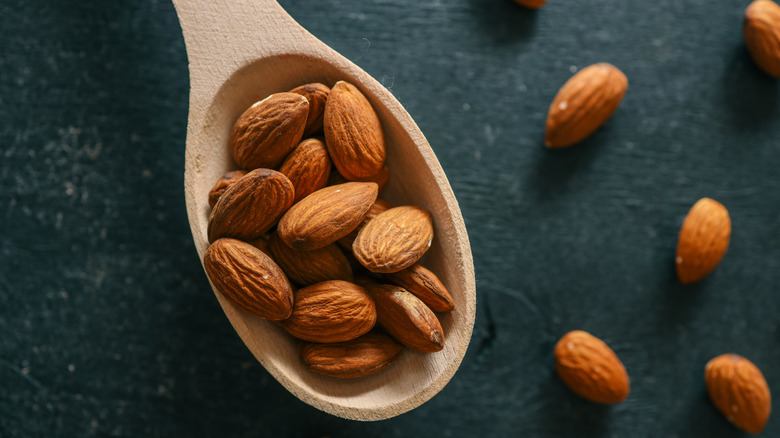13 Nut And Seed Recalls That Affected Millions
We may receive a commission on purchases made from links.
Eaten as a snack, added to salads and pasta sauces, or sprinkled over breakfast bowls, nuts and seeds make a versatile addition to any diet. In particular, their mildly sweet, umami flavor and crunchy texture bring depth and balance to a variety of dishes. Aside from their snackability and culinary appeal, nuts and seeds are also highly nutritious. While they may be a little high in calories, nuts are a great source of antioxidants, unsaturated fats, omega-3 fatty acids, fiber, and L-arginine, which may help lower blood pressure. Just like nuts, seeds offer essential nutrients, such as fiber, omega-3 fatty acids, and selenium.
Whether it's almonds and cashews or pumpkin seeds, these small nibbles are typically eaten raw and require very little processing. While this makes nuts and seeds an appealing dietary choice, it also means that they are vulnerable to food safety issues. If not appropriately handled, they can carry pathogens, such as salmonella or listeria. In some cases, nut and seed recalls have also been triggered by the presence of allergens that haven't been declared on the product packaging. Curious about the biggest nut and seed recalls in U.S. history? Keep reading!
Advantage Health Matters recalls Organic Traditions Jumbo Pumpkin Seeds over fears of salmonella contamination (2025)
While some people choose to separate fresh pumpkin seeds from pumpkin pulp at home, others take the easy way out and buy them pre-packaged. Ideal for snacking, pumpkin seeds are typically sold either shelled or unshelled for on-the-go convenience. When Advantage Health Matters recalled its Organic Traditions Jumbo Pumpkin Seeds in May 2025, it was the shell-free version of the seeds that was pulled from the grocery store shelves. The move was triggered by a recall initiated by an international supplier after concerns over potential salmonella contamination. The product was sold in clear plastic bags at stores in New York, New Jersey, and Virginia, as well as online.
Although no illnesses were linked to the pumpkin seeds at the time of the recall, salmonella can be very serious. The symptoms of the infection in healthy adults often include abdominal pain, fever, diarrhea, nausea, and vomiting. Salmonella can be particularly dangerous for young children, the elderly, and individuals with compromised immune systems, sometimes leading to hospitalization and even death.
Mauna Loa Macadamia Nut Company recalls Mauna Loa Dark Chocolate Covered Macadamias due to undeclared allergens (2025)
When a customer buys a packet of macadamias, that is exactly what they expect to find in the packaging. And rightly so — they shouldn't have to worry about other nuts or hidden allergens making their way into the mix. Unfortunately, this is exactly what happened in April 2025, when the Mauna Loa Macadamia Nut Company recalled its Mauna Loa Dark Chocolate Covered Macadamias. The health alert was raised after the company discovered that the product could contain almonds and cashews, which were not declared on the packaging. The 0.6-ounce and 4-ounce bags of Mauna Loa Dark Chocolate Covered Macadamias were distributed in 16 states and Guam, resulting in a relatively widespread recall.
Both almonds and cashews fall under the definition of tree nuts, which is one of the nine major allergens recognized by the FDA. The other eight allergens include milk, eggs, fish, shellfish, peanuts, wheat, soybeans, and sesame. While allergic reactions vary by individual, some people may experience symptoms such as hives, itching, swelling, vomiting, diarrhea, dizziness, and wheezing. At the more serious end of the spectrum are severe reactions, including swelling of the throat, difficulty breathing, loss of consciousness, and death.
Natural Sourcing International recalls organic black chia seeds due to salmonella contamination (2024)
Chia seeds were consumed by the Aztecs and Mayans in Central and South America around 5,500 years ago. Sourced from the salvia hispanica plant, the black or white seeds have recently surged in popularity in the U.S. due to their impressive nutritional profile. Tiny but mighty, chia seeds are packed with antioxidants, fiber, plant-based protein, omega-3 fatty acids, calcium, phosphorus, and magnesium. In addition, chia seeds contain electrolytes, which can help maintain hydration.
In 2024, chia seeds came under public scrutiny for all the wrong reasons, when Natural Sourcing International recalled its Great Value Organic Black Chia Seeds due to potential contamination with salmonella. The 32-ounce pouches of the superfood were sold at Walmart stores across the U.S. While no salmonella infections were linked to the seeds at the time, Natural Sourcing International announced the recall "out of an abundance of caution."
Despite the absence of reported illnesses, the FDA categorized the alert as a Class I recall, the highest designation possible, which refers to "a situation in which there is a reasonable probability that the use of or exposure to a violative product will cause serious adverse health consequences or death."
Texas Pecan recalls a range of nuts due to undeclared allergens (2024)
When it comes to food recalls over hidden allergens, the Texas Pecan nut case of 2024 was especially notable. The health alert was sparked after the Texas Department of State and Health Services conducted a routine inspection of the company's packaging equipment, discovering that it could contain traces of not just one but six different allergens, including peanut, tree nuts, soy, milk, sesame, and wheat. All of these ingredients appear on the FDA's list of the nine major food allergens.
Following the inspection, Texas Pecan pulled over 100 different products from supermarket shelves, including a range of almonds, Brazil nuts, cashews, macadamias, pecans, pistachios, pumpkin seeds, and walnuts. The company also recalled several trail mixes, as well as wasabi peas, rice crackers, sweetened mango slices, raisins, and chocolate products. While some packages listed tree nuts as an ingredient, they failed to list the nuts individually, leading to potential confusion.
Hormel Foods recalls Planters nuts due to potential contamination with listeria monocytogenes (2024)
Founded as Geo. A. Hormel & Company in 1891, Hormel Foods is a commercial powerhouse. What started as a small meatpacking company in Austin, Minnesota, has grown to become a household name with a portfolio of some of the most famous brands on supermarket shelves. One of these is Planters, an iconic label that offers a lineup of nut products, seeds, cheese balls, and cheese curls.
Proving that no brand is too big for a recall, Hormel Foods recalled two nut products in 2024 due to safety concerns. The 4-ounce packages of Planters Honey Roasted Peanuts and 8.75-ounce cans of Planters Deluxe Lightly Salted Mixed Nuts were pulled from the shelves after it was discovered that they could be contaminated with listeria. The nut products were shipped to Publix distribution centers in Florida, Georgia, Alabama, and North Carolina, as well as Dollar Tree warehouses in South Carolina and Georgia.
If ingested, listeria monocytogenes can lead to a serious condition known as listeriosis, which can be particularly dangerous for young children, the elderly, and those with weakened immune systems. The infection can also cause symptoms in healthy adults, such as fever, headaches, nausea, abdominal pain, and diarrhea.
Western India Cashew Company recalls Trader Joe's cashews because of possible salmonella contamination (2024)
Established in 1932 in India, the Western India Cashew Company is best known in the U.S. for its Wenders cashew brand, although it also produces nut butters. According to the Western India Cashew Company website, the company takes a "proactive approach in ensuring product quality and safety standards," and was "one of the first in the world to implement and document validated kill-steps for microbial reduction in cashews as early as 2009."
These safety claims came into question in 2024, when the Western India Cashew Company recalled Trader Joe's Nuts – 50% Less Sodium Roasted & Salted Whole Cashews due to possible salmonella contamination. The issue came to light during a routine inspection by the FDA at the time of import. Depending on the specific item, the nuts were imported from either India or Vietnam. The cashews were sold at Trader Joe's stores in 16 U.S. states.
NOW Health Group recalls macadamia nuts over fears of possible salmonella contamination (2020)
Dating back to 1968, when it was founded as NOW Foods, the NOW Health Group is a family-owned enterprise that specializes in supplements, essential oils, organic beauty products, and natural foods. In particular, the Illinois-based company sells wholesome, healthy kitchen staples like cooking oils, grains, flours, beans, teas, and sweeteners. It also offers a range of nuts, including almonds and pecans.
NOW Health Group states on its website that "high-quality starts with clean ingredients." Furthermore, the company claims to utilize "comprehensive scientific processes" to ensure that all its ingredients satisfy its stringent standards. This stated commitment to quality came under scrutiny in 2020 when NOW Health announced a recall of its 8-ounce pouches of NOW Real Food Raw Macadamia Nuts due to potential contamination with salmonella. The problem was uncovered during routine testing of the product. Fortunately, no illnesses had been reported after consuming the raw macadamias at the time of the recall.
The Wonderful Company recalls a range of pistachio products after a salmonella outbreak (2016)
The Wonderful Company's pistachios caused a wave of infections before being pulled from commercial circulation. More specifically, the products were linked to at least 11 cases of salmonella, including two hospitalizations, across nine states. Luckily, no deaths were associated with the contaminated food item.
The tainted pistachios were sold throughout the U.S., as well as in Canada, Mexico, and Peru, under three distinct labels — Wonderful, Paramount Farms, and Trader Joe's. All in all, more than 40 pistachio products were pulled from grocery store shelves, including Trader Joe's Dry Roasted & Unsalted Inshell Pistachios, Wonderful Roasted Sweet Chili Pistachios, and Paramount Farms Roasted Salted Inshell Pistachios. The kernels were withdrawn from the market after testing detected the presence of salmonella in raw pistachios at Paramount Farms in Lost Hills, California, where they were grown.
Texas Star Nut & Food recalls range of nuts due to salmonella risk (2015 and 2016)
The Texas Star Nut & Food recall came in two waves — both linked to concerns over salmonella contamination. The first recall was announced in October 2015 after routine sampling by the FDA detected traces of salmonella. The affected products included 6-ounce packages of Nature's Eats Natural Macadamia Nuts and 8-ounce packages of Southern Grove Simply Raw Trail Mix. The products were distributed in Texas, North Carolina, Florida, Georgia, and Tennessee. No known cases of illness were linked to the products when the recall was issued.
Just three months later, in March 2016, Texas Star Nut & Food issued another recall — this time initially involving pistachios. Once again, the culprit was salmonella, which was discovered during random FDA testing of the company's Nature's Eats Natural Pistachio Kernels. The recall was later expanded to include other items under three brand names: Fresh Choice, Southern Grove, and Nature's Eats. Among the recalled products were Southern Grove Go Raw, Fresh Choice Survivor Mix, and Nature's Eats Almond & Pistachio Duo.
ARO Pistachio and other companies recall pistachios due to salmonella contamination (2013)
ARO Pistachio hit more than a snag when its nut kernels were linked to salmonella in 2013. The pistachios, which were a part of the company's 2012 harvest, were processed at its Terra Bella facility in California. ARO had already shipped the nuts to several third-party brands, causing a cascade-like effect across brands. The FDA initially gave the ARO Pistachio recall a Class II designation, later upgrading the incident to Class I due to the serious risk the nuts posed to consumers.
Torn and Glasser, which sourced pistachios from ARO Pistachio, issued a recall of its products shortly after learning of the salmonella contamination. The recall affected salted and roasted pistachios sold under four different brand names, including Torn and Glasser, Hilo Label, Sun Harvest Label, and Sprouts Label. Another company affected by ARO's recall was Western Mixers Produce & Nut Company, which had to remove its Treasured Harvest pistachio products from the market.
Townsend Farms and Scenic Fruit recall pomegranate seeds after hepatitis A outbreak (2013)
While fruit seeds are often seen as a nuisance, pomegranate seeds are an exception. The little red pearls can be used as a nutritious and tasty topping for yogurt, oatmeal, salads, and desserts. Also called arils, the seeds are packed with antioxidants, vitamins, and nutrients, including vitamin C, potassium, and magnesium.
In 2013, both Townsend Farms and Scenic Fruit recalled a range of products containing pomegranate seeds after an outbreak of hepatitis A. More than 140 cases of hepatitis A, including at least 60 hospitalizations, were linked to the seeds, which had been imported from Turkey. These included Townsend Farms Organic Anti-Oxidant Blend Frozen Berry Mix, Harris Teeter Organic Antioxidant Berry Blend, and Woodstock Organic Pomegranate Kernels.
Hepatitis A is a serious infection caused by eating food contaminated with the virus. This can happen when an infected person handles the food without washing their hands. The symptoms of a hepatitis A infection include fever, fatigue, joint pain, nausea, vomiting, and abdominal pain.
Sunland recalls peanuts due to salmonella contamination (2012)
In 2012, roasted, blanched, and salted peanuts were part of a significant recall that involved a wide range of nut products. Sunland first raised the health alert after its peanut butter and other nut butter products were linked to a salmonella outbreak involving at least 35 people. Approximately three weeks later, the company expanded the recall to include a range of raw and roasted shelled and in-shell peanuts processed in a separate building from the one used to manufacture the other contaminated products. Sunland's Peanut Butter Plant and its Peanut Processing Plant were both located at a facility in Portales, New Mexico.
In total, Sunland withdrew more than 100 different products from the market, fearing that they may be contaminated with salmonella. While most of them were sold under the Sunland label, others appeared on store shelves under brand names such as Trader Joe's, Tropical Traditions, and Yogurtland. The food items included peanut butters, cashew butter, and tahini, as well as non-blended nut products like Sunland Raw Shelled Peanuts and Sunland Salted Roasted Virginia Peanuts.
Paramount Farms recalls raw almonds after salmonella outbreak (2004)
Headquartered in California's Central Valley, Paramount Farms is the largest integrated grower and processor of pistachios and almonds in the world. As such, it's not surprising that the company's 2004 almond recall, prompted by salmonella concerns, was a significant one. The health alert was issued after Paramount Farms' almonds were linked to a salmonella outbreak that sickened at least 29 people in the U.S. and Canada. While several of those who fell ill were hospitalized, no deaths were reported at the time of the recall.
In total, Paramount Farms ended up recalling 13 million pounds of raw almonds that had been distributed across the U.S. and internationally. Three of the brands involved in the recall were Kirkland Signature, Trader Joe's, and Sunkist. The recall was complicated due to the fact that the nuts were also shipped to approximately 50 distributors, some of whom repackaged the almonds and sold them under different brand names.
